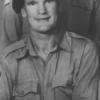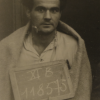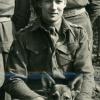Anthony Hunter-Choat was born on January 12 1936 in Purley, south London, the son of Frederick, who worked in insurance, and Iris, a schoolteacher. The family would later move to Ascot.
Tony was educated at Dulwich College and then Kingston College of Art, where he trained as an architect. On holidays he hitchhiked around Europe, developing a taste for travel and an affinity for languages.
In March 1957, having decided that architecture was not for him, he decided to indulge his thirst for adventure and made his way to Paris to enlist in the Foreign Legion. He was pursued by his mother, keen to get her errant son back to his studies, but by the time she caught up with him he had signed up.
Hunter-Choat was sent for basic training to Algeria, then in the throes of increasing anti-colonialist insurrection, and volunteered to complete the extra training necessary to become a paratrooper. He was duly posted, on October 15, to the 1st Battalion, Régiment Etranger de Parachutistes (1e REP), with which he would be involved in continuous operations for almost five years.
By the late 1950s the Algerian War of Independence had become a high-intensity conflict fought on a wide scale, and required the presence on the ground of 400,000 French and Colonial troops to maintain a semblance of order.
Hunter-Choat and his comrades were involved in hundreds of operations, and suffered and inflicted considerable casualties. In February 1958, as a young machine-gunner, he took part in the battle of Fedj Zezoua, in the woods east of Guelma, in the north-east of the country. Two armed units of the rebel Front de Libération Nationale (FLN) were dug in on a hillside. The legionnaires began their attack at 7am and met stiff resistance, but after being dropped by helicopter (balancing precariously on a cliffside) in the midst of the FLN positions, they overwhelmed the enemy. Hunter-Choat was awarded the Cross of Valour – the first of three. He would also be awarded the Médaille Militaire.
Less than two weeks later he was wounded as the 1e REP pursued FLN groups through the wooded territory close to the border with Tunisia.
It was an odd fact of life in the Legion that one in four of his NCOs was German, and many had fought on the Russian Front. Hunter-Choat recalled that their homes had become marooned behind the Iron Curtain and that, to his brothers-in-arms named Adolf, Rolf, Hans or Karl, the Legion had “become their country”. Some of them were former SS troops and were, Hunter-Choat noted, “superb soldiers and great trainers of men”. “They would expose themselves to danger in order to bring on the young soldiers,” he said.
After recovering from his wounds he was repeatedly involved in intense fighting against the FLN. But as the tide of war turned, and it became clear that Paris was preparing to negotiate Algeria’s independence, Hunter-Choat found himself fighting his own side.
The Algiers putsch, as it became known, was a coup launched by four retired French generals to oust De Gaulle and seize control first of Algeria, then of Paris. Hélie de Saint Marc, commander of the 1e REP, agreed to take part, and, on the night of April 21/22 1961, Hunter-Choat was part of the plotters’ force which occupied key locations in Algiers.
On April 22 the message was broadcast throughout Algeria: “The army has seized control.” The following day, however, de Gaulle appeared on television, wearing his uniform of 1940, and called for soldiers to back him. As his message was retransmitted through barracks, support for the coup collapsed. The 1e REP was disbanded; as its men were marched out of camp they sang Edith Piaf’s Non, Je Ne Regrette Rien. Shortly afterwards Hunter-Choat’s five-year term of service expired and he returned home.
His father encouraged him to join the British Army, but his first application for a short service commission, in March 1962, was rejected by the War Office as he “exceeds the age limit for a commission under any existing procedures”. By April a second letter, written by his father, elicited a more positive response: “It has been agreed that you may be accepted, as a special case, for consideration.”
After passing out top of his course at Mons officer cadet school he was commissioned into the 7th Gurkha Rifles (Duke of Edinburgh’s Own) and posted to Malaya. From there, in early 1963, he was sent to Brunei and on to Sarawak and Borneo, where he fought in what became known as the Indonesian Confrontation . The scale and ferocity of this war was considerably lower than Algeria, but the hostility of the climate and jungle environment made for hard soldiering. Jungle patrols often lasted several weeks and contact with the enemy, though infrequent, was frequently a vicious affair. While there Hunter-Choat took part in cross-border raids into Indonesia (officially denied at the time) as well as coastal raids.
He was now keen to convert to a regular commission. Told that he was too old to do so in the infantry, he discovered that the Royal Artillery age limit was higher, and joined in early 1964. Upon transfer, he remained in Borneo, where he served as a forward observation officer until 1966, when he returned to Britain.
Hunter-Choat attended staff college at Camberley in 1969-70, then served in 45 Regt RA before becoming a battery commander and second-in-command of 3 Royal Horse Artillery in Hong Kong.
Between 1975 and 1977 he was on the directing staff of the junior division of the staff college at Warminster and then, unusually for an officer without a British special forces background, was offered command of 23 Special Air Service Regiment, a territorial unit. His accomplishments there were so highly regarded that he remained with special forces, in a variety of command and staff roles, for the rest of his Army career.
He commanded 23 SAS until 1983, though the sensitivity of his work during this period means that, to this day, few details of his service can be published.
From 1983 to 1986 he was a senior staff officer at Nato headquarters and a special forces adviser to the Supreme Allied Commander Europe. His last post was a personal liaison between the Commander-in-Chief of BAOR and his American equivalent.
He was appointed OBE.
After his retirement from the Army in the rank of colonel he immediately became commander of the Sultan of Oman’s special forces in the rank of brigadier. He was responsible for increasing numbers in the Sultan’s special forces from under 1,000 to more than 2,000, and for improving their equipment and capability. In 1995 he was presented with the Omani Order of Achievement by Sultan Qaboos.
He retired from the Sultan’s service in 1997, and in 1998-99 he helped verify the crumbling ceasefire in Kosovo, before becoming head of security for the Aga Khan. This involved helping to create a base for the Aga Khan, famous for his interest in the Turf, at the celebrated racing town of Chantilly, France.
After the American-led invasion of Iraq in 2003, Hunter-Choat became head of security for the Program Management Office (PMO), which was involved in overseeing the distribution of billions of dollars of reconstruction funds to projects throughout the country. There he briefly became embroiled in controversy after the PMO awarded a contract worth $293 million to Aegis, a private security company headed by Tim Spicer.
According to Vanity Fair, Hunter-Choat and Spicer had known each other for years. DynCorp, a rival to Aegis, lodged a protest with the US Congress, but this was rejected, and there was no suggestion that Hunter-Choat had behaved improperly.
Hunter-Choat was later responsible for the security plans for US Aid in Afghanistan. He was also an accomplished lecturer on leadership and security issues.
Hunter-Choat was a Fellow of the Royal Society of Arts and a Freeman of the City of London. He was a former president and secretary general of the British branch of the Foreign Legion Association and also a keen Freemason.
He was appointed an Officer of the Legion of Honour in 2001 and promoted Commander in 2011.
Tony Hunter-Choat was regarded by his friends and comrades as an outstanding soldier and leader.
He married, first, in 1964, Maureen McCabe. The marriage was dissolved, and he married secondly, in 1982, Linda Wood. He is survived by his wife and their son and two daughters, as well as by two daughters of his first marriage.
Brigadier Tony Hunter-Choat, born January 12 1936, died April 12 2012
With kind permission of The Daily Telegraph.
Read More




Latest Comments
There are currently no comments for this content.
Add Comment
In order to add comments you must be registered with ParaData.
If you are currently a ParaData member please login.
If you are not currently a ParaData member but wish to get involved please register.